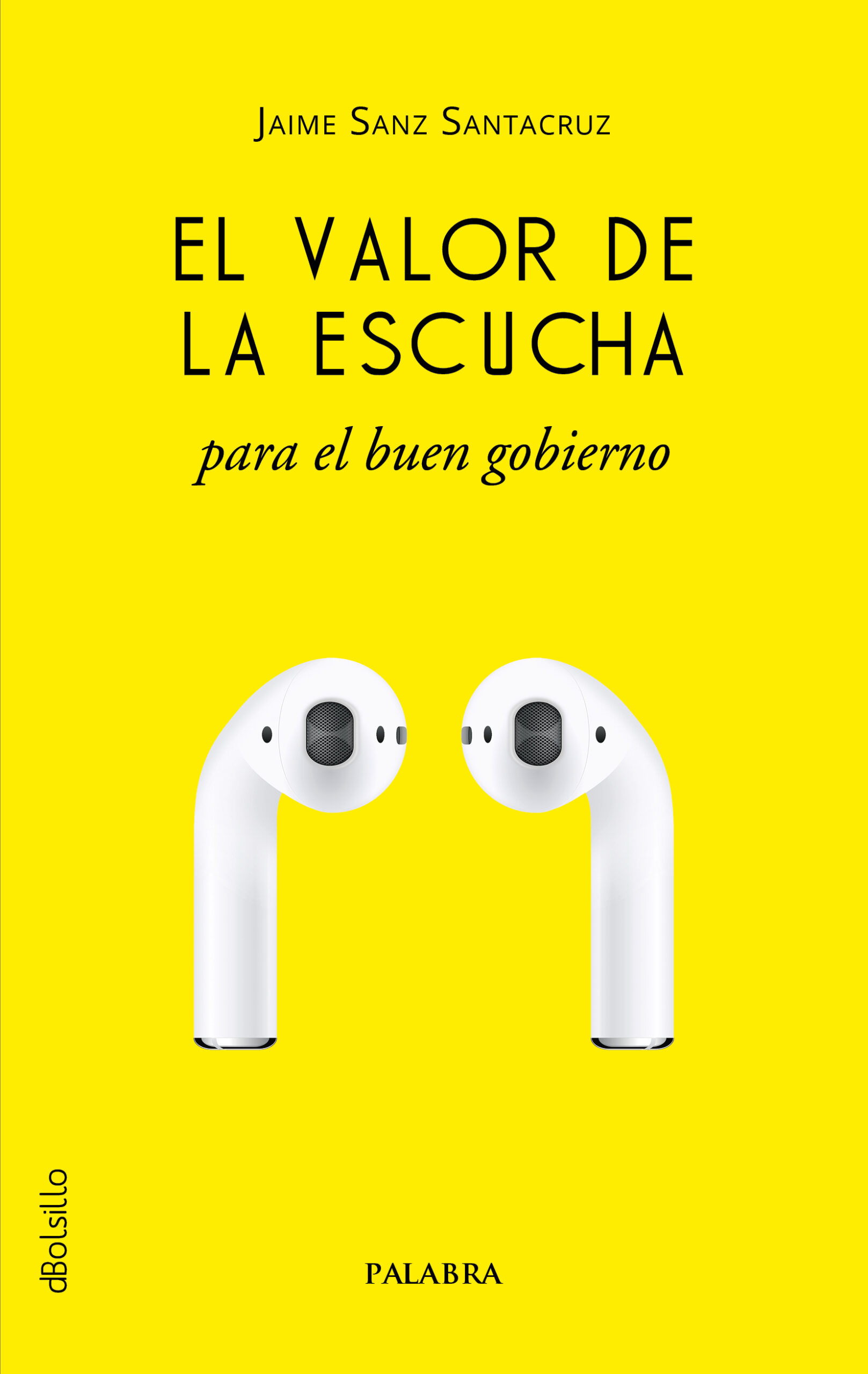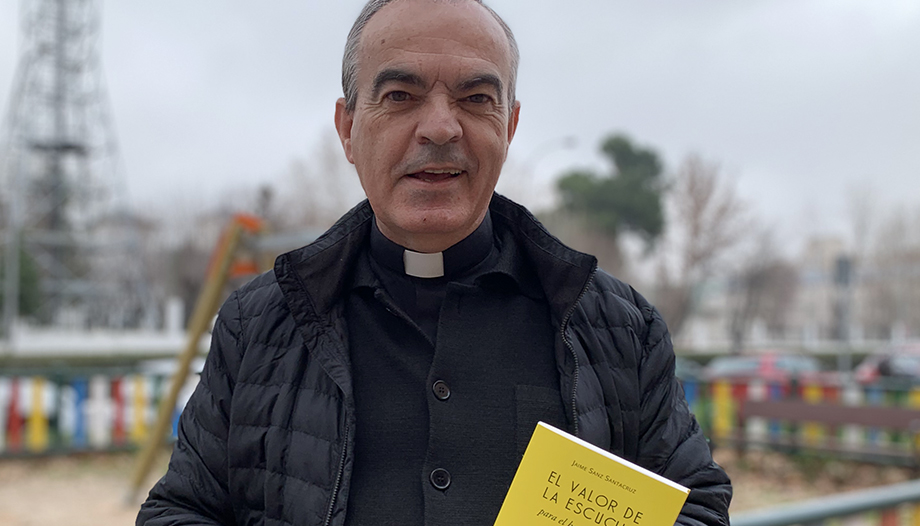"It's hard for us to listen; I'm the first," says priest Jaime Sanz emphatically at the beginning of this interview. For that reason, and for many others, Sanz decided to write a book that, in its simplicity, is more than recommendable reading for many people today.
In fact, the listen has become, in recent years, a necessity in a society that hears many things and listens to very few. Beyond a strategic use of listening, Sanz Santacruz, who "as a priest I am professionally dedicated to listening," proposes a change of attitude both personally and corporately.
You have written about love, friendship and prayer. And now, about listening. Why was the book born?
-Talking to a professor at IESE, he told me that listening is one of the great themes of this century. We also see it in the Church; for example, it is one of the great guiding threads of Opus Dei as it prepares for its first centenary.
We are in a society in which we do not listen to politics, we do not listen to listen In the company and even in families, people complain that no one talks or no one listens. In the end, it's all because we are focused on a misunderstood efficiency.
We priests are professionally dedicated to listening. And I have been a priest for more than 25 years. When you listen to such different people you learn a lot. Thanks to this knowledge that I have been accumulating, I was able to write the book.
How to listen in these times of continuous rush?
-In the case of the family, for example, less time is now spent together, and we often see broken family relationships at the outset.
Listening in families is complicated because the time in big cities is very limited, but I think it is about looking for quality time, that rest is also time to listen. As Pep Borrell says "dancing in the kitchen". That means that the time we spend with the family doing certain unavoidable tasks (shopping, cooking, cleaning...) should be a time when we feel at ease.
In addition, you have to know how to disconnect. The cell phone is the biggest enemy of listening. We spend our lives looking at our cell phones, without being interested in the person in front of us. Listening is a way of loving. When you listen to someone, you are loving them. Society, family, organizations... improve when there is this listening environment.
He claims we don't listen, but governments, brands, companies... claim to want to know about citizens. Tactics, necessity, a weapon of war?
-Listening is not the same as hearing. We see many mechanisms of listen In society, for example, in the political parties, which are dedicated to know what is said, but they have a decision made and that knowledge does not influence anything. That is why it is important that in the Church we do not do as in the political sphere, where there is a lot of talk about press the street and then they don't give a damn.
Moreover, listening channels are necessary in all organizations. Also in families: a mother who does not listen to her children or a father who only imposes his opinion is impossible for them to gain the trust of their children, and therefore, for there to be unity. Listening is very important because, as I say in the book, unity is bidirectional, almost circular. Both from those "above" to those "below" and the other way around.

The value of listening for good governance
But the person in charge may argue that he or she "has more data" or "knows more about the subject."
-Listening adds arguments to your own decision. He who does not listen is arrogant. He thinks, indeed, that he "knows about it". But perhaps there are people around him who know much more. The boss who does not allow his subordinates to do anything, nor does he try to get them to train or to move up, does so out of fear, because he is mediocre.
In the book I speak at various points of the government of the mediocre, of those who do not want others to overshadow them. A good ruler promotes his people and this can be applied to all levels: civil government, business, the Church or a family.
Whoever governs has to count on others, to be aware of the feedback that your decisions have. It is very important that, when a suggestion is made to you, the first thing you should always do is to thank them.
Secondly, realizing that this opinion -even if it is contrary to your own- helps to justify every decision very well and, moreover, to leave the door open so that, at some point, the decision can be changed.
In this sense, we find a certain fear - not without truth - of saying something, for fear that this information will "turn against" us.
-This is where trust comes into play. Trust is the basis of true listening. If you distrust - or those at the top make you distrust - because suggestions are used to push aside anyone who doesn't think like the leaders, you lose legitimacy and, above all, the opportunity to improve.
It is enriching to have people who think differently in a government council. If the only people on that council are "the balls" who are there because they don't say what they think, nothing is contributed to society. On the other hand, with the opposite, it may cost a little more to reach some agreements, but they will be much more global and correct.
At the same time, criticism must always be constructive. Simply saying that everything is wrong does not contribute anything, nor does the attitude of the one who criticizes and thinks that only the solution he provides exists. When one thinks that his solution is the only one, then he is becoming the tyrant who criticizes.
Another topic I talk about in the book is transparency. You cannot ask others to join your project in an organization if you do not involve them in the means, the project, the results. When you don't act in this way, it is either because you are hiding something that is not going well, or because of a misunderstood paternalism, which is harmful.
In the Church we have a separate "player": the Holy Spirit and there is also a hierarchy. Have we identified listening with a form of assemblyism?
-Following Luigino Bruni, in the book I speak of Organizations Moved by an Ideal (OMI), in which we can include the institutions of the Church.
In these organizations there is always verticality. In the case of the Church we have the hierarchy according to the sacrament of Holy Orders, but the Second Vatican Council already spoke of opening up to other organisms of the Church. To govern is not to direct an organization in a unipersonal way. That is neither prudent nor efficient.
It is necessary to ask questions before making any decision. It is very important to ask others, especially if the subject affects them in some way. It is about realizing that your opinion is not inspired by the Holy Spirit, but that it is just another opinion, even if you have more data. Obviously, this does not mean that you have to make a kind of dialectic of listening, but to create a culture, a way of listening.
Still at the ecclesial level, do we run the risk of diluting the charisms under the guise of an "adaptation" born of this listening?
-Listening is closely linked to humility. When one has the humility to think that one occupies an important position because "there is no other". Not because I am the best, not because I am the one who best embodies the spirit - in the case of an IMO - but because I have been given it and it is temporary.
I believe that the step that has been taken in the Church to limit the time of government in the international associations of the faithful is very interesting. I am convinced that renewal is fundamental. An organization in which the same people always occupy its governing bodies runs the risk of ending up tyrannizing that form of government.
There is no one whose job is to govern for life. It is much more enriching for people to pass on. When you govern for a specific period of time, you are more capable of continuing what has been done by those who have preceded you and preparing those who will come after you. Basically, you contribute what you know and, when someone else comes along, they will contribute other ideas. All this while being faithful to the way of life in your organization or, if we are talking about Church institutions, faithful to the charism.
In these IMOs, for example, in the institutions of the Church, the founder or foundress are the persons who have incarnated the charism. In this sense, sometimes we can lose the perspective that they are an instrument of God and we think that we have to replicate their life without openness or diversity. The founders and foundresses of ecclesial charisms are instruments. In them, God concentrates a message - a charism - a way of living the Christian life.
Fidelity to the charism is very important, because it is not a question of developing a charism in an assembly way, but to take into account the purpose. It is necessary to focus on the purpose, not to deify the founder. In fact, the founders of the institutions of the Church have been humble. They were aware that this charism was not their own invention, but was given to them by God. Those who follow a charism have to live a fidelity to this path, adapting the charism to the time in which it develops, because circumstances change.
Adapting the charism well to the time in which you live is part of fidelity. The charism in the Church is not for a single moment or a single concrete situation or problem. It is universal and for all times.








